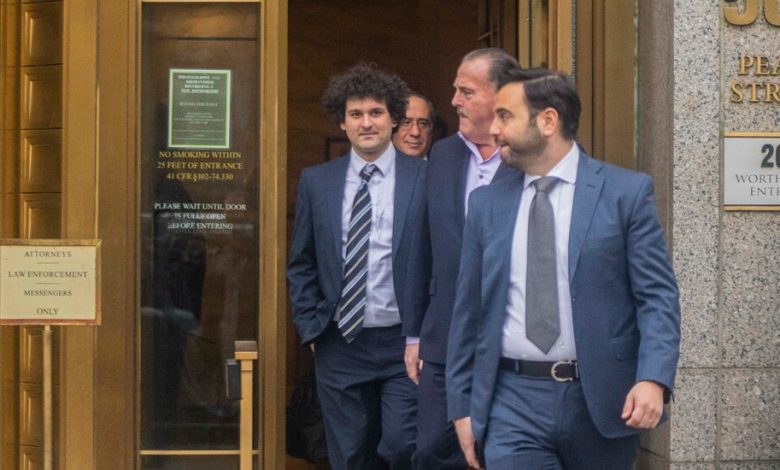Sam Bankman-Fried, in First Detailed Defense, Seeks to Dismiss Charges

Sam Bankman-Fried, the founder of the collapsed cryptocurrency exchange FTX, has issued his first detailed legal defense since prosecutors accused him of fraud, seeking to dismiss several of the charges and claiming that the high-powered law firm representing FTX in its bankruptcy has been doing the government’s bidding.
In court filings late Monday, lawyers for Mr. Bankman-Fried said FTX and its lawyers at the firm Sullivan & Cromwell had become de facto agents of federal prosecutors building the criminal case against him and might be withholding crucial evidence.
“FTX’s legal advisors went to the government to accuse Mr. Bankman-Fried behind his back without knowing the full facts, and ultimately forced him to step down as C.E.O.,” the lawyers wrote.
For months, Sullivan & Cromwell has funneled documents and other evidence to the prosecution, the filings say. Mr. Bankman-Fried’s lawyers claimed that prosecutors had been seeking only the most incriminating documents, even though FTX might also be sitting on material that could help the defense.
In effect, they argued, prosecutors have been “outsourcing” the legal requirement to provide potentially helpful material to the defense team, shifting that responsibility to a “private party” with no obligation to Mr. Bankman-Fried.
Representatives for FTX, Sullivan & Cromwell and the U.S. Attorney’s Office in Manhattan did not immediately respond to requests for comment.
Federal prosecutors have charged Mr. Bankman-Fried with orchestrating a vast fraud that misappropriated billions of dollars in customer money from FTX. The authorities have also charged him with money laundering, bribing the Chinese government and overseeing an illegal campaign finance scheme that showered tens of millions of dollars on Democratic and Republican candidates.
Mr. Bankman-Fried, 31, has pleaded not guilty to those charges. His lawyers at the New York firm Cohen & Gresser have said they are prepared to go to trial in federal court in Manhattan as soon as October.
Mr. Bankman-Fried was released on bail in December but confined to his parents’ home in Palo Alto, Calif. He faces an uphill legal battle. Three of his top colleagues have pleaded guilty and are cooperating with prosecutors. If convicted, he could spend decades in a federal prison.
The motions filed on Monday are most likely the first of many attempts by Mr. Bankman-Fried’s legal team either to seek the production of more documents from prosecutors or to persuade Judge Lewis A. Kaplan of Federal District Court in Manhattan to dismiss some of the 13 counts against him.
In all, Mr. Bankman-Fried is seeking to dismiss 10 of the charges. The filings argue that four of the counts — including the foreign bribery charge, the campaign finance charge and a bank fraud charge — violated elements of the extradition process between the United States and the Bahamas, where Mr. Bankman-Fried was arrested. In extradition cases, prosecutors are usually limited in bringing new charges after a defendant has been transferred.
The defense lawyers argued that another six of the charges should be dismissed for being too vague or having other legal flaws. They said the prosecutors had displayed an “eagerness to run up charges against Mr. Bankman-Fried.”
Much of the defense’s early strategy also focuses on the role of Sullivan & Cromwell in the case. Mr. Bankman-Fried had hired lawyers from the firm to help with a range of legal tasks before FTX collapsed. When the exchange imploded, Sullivan & Cromwell’s lawyers took control, naming a veteran restructuring expert, John Jay Ray III, to replace Mr. Bankman-Fried. One of Mr. Ray’s first acts was to issue a scathing report that said FTX under Mr. Bankman-Fried had lacked internal controls.
But in January, the U.S. trustee in the bankruptcy case raised objections to the law firm’s representation of FTX, arguing that it had not fully disclosed the extent of its previous legal work for the exchange. One of FTX’s former internal lawyers claimed in a court filing that Sullivan & Cromwell’s earlier work created major conflicts of interest.
A judge ultimately ruled that the firm could continue to oversee the bankruptcy.
In the court filings on Monday, Mr. Bankman-Fried portrays Mr. Ray, FTX and the lawyers at Sullivan & Cromwell as all working against him, with the blessing of the government.
Mr. Ray, FTX and the lawyers “have acted as a public mouthpiece for the government” and “have assumed the role of prosecutor by publicly labeling” Mr. Bankman-Fried as “‘the villain,’” the filings say.
